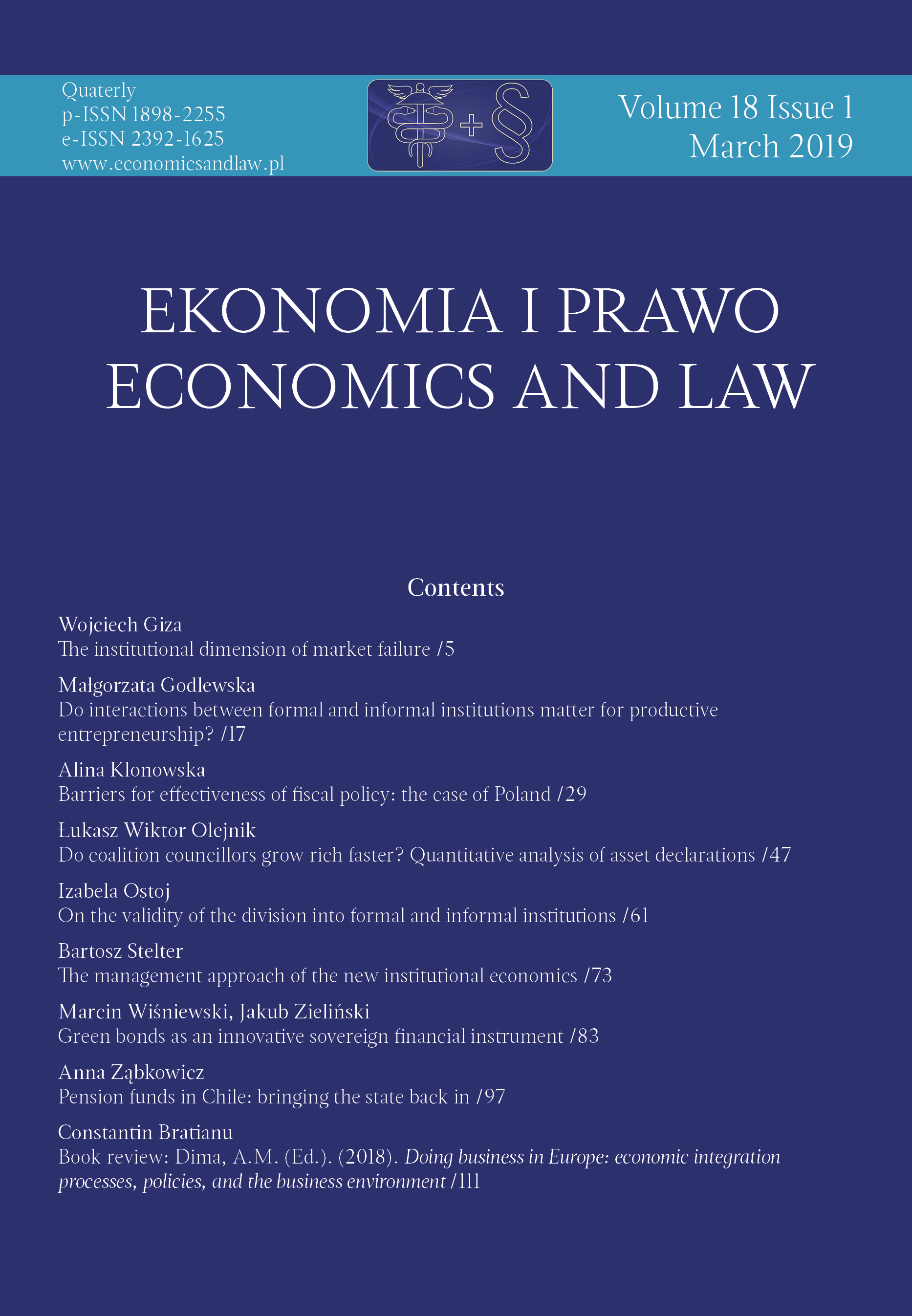The institutional dimension of market failure
DOI:
https://doi.org/10.12775/EiP.2019.001Keywords
market failure, institutional economics, neoclassical economicsAbstract
Motivation: At the turn of the 19th and 20th centuries, institutionalism was presented by T. Veblen as an alternative to neoclassical economics. On the basis of neoclassical economics, in addition to the explanation how an effectively functioning market leads to maximization of welfare, we also find a market failure analysis. The main theme of the presented study is an attempt to synthesize these concepts, in particular to show how the institutional approach modifies the perception of the market failure.
Aim: The aim of the article is to analyze the market failure on the basis of institutional economics. In addition, an attempt was made to determine how institutional solutions can result in limiting certain types of market failure.
Results: In the light of the analysis carried out, the analysis of market failure based on Veblen’s institutionalism is not justified. However, the relation between the New Institutional Economics and the neoclassical interpretation of market failure can be noticed, mainly, when it comes to explaining the reasons for the existence of markets and the methods used to counteract external effects.
References
Akerlof, G.A. (1970). The market for ‘lemons’: quality uncertainty and the market mechanism. The Quarterly Journal of Economics, 84(3). doi:10.2307/1879431.
Arrow, K.J. (1969). The organization of economic activity: issues pertinent to the choice of market versus non-market allocation. In Joint Economic Committee (Ed.), The analysis and evaluation of public expenditures: the PPB system. Washington: G.P.O.
Arrow, K.J., & Debreu, G. (1954). Existence of an equilibrium for a competi-tive economy. Econometrica, 22(3). doi:10.2307/1907353.
Bator, F.M. (1957). The simple analytics of welfare maximization. The Ameri-can Economic Review, 47(1).
Bator, F.M. (1958). The anatomy of market failure. The Quarterly Journal of Economics, 72(3). doi:10.2307/1882231.
Buchanan, J.M. (1965). An economic theory of clubs. Economica, 32(125). doi:10.2307/2552442.
Buchanan, J.M., & Stubblebine, W.C. (1962). Externality. Economica, 29(116). doi:10.2307/2551386.
Chamberlin, E.H. (1933). Theory of monopolistic competition. Cambridge: Har-vard University Press.
Coase, R.H. (1937). The nature of the firm. Economica, 4(16). doi:10.2307/2626876.
Coase, R.H. (1959). The federal communications commission. Journal of Law and Economics, 2. doi:10.1086/466549.
Coase, R.H. (1960). The problem of social cost. Journal of Law and Economics, 3. doi:10.1086/466560.
Colander, D. (2015). Framing the economic policy debate. History of Political Economy, 47. doi:10.1215/00182702-3130535.
Cournot, A.A. (1838). Recherches sur les principes mathématiques de la théorie des richesses. Paris: Hachette.
Garbicz, M., & Staniek, Z. (2010). Mikroekonomia. Problemy zawodności rynku. Warszawa: Wyższa Szkoła Menedżerska w Warszawie.
Giza, W. (2013). Zawodność rynku. Powstanie i rozwój idei. Kraków: Uniwersytet Ekonomiczny w Krakowie.
Greenwald, B.C., & Stiglitz, J.E. (1986). Externalities in economies with im-perfect information and incomplete markets. Quarterly Journal of Economics, 101(2). doi:10.2307/1891114.
Marciano, A., & Madema, S.G. (2015). Market failure in context: introduc-tion. History of Political Economy, 47. doi:10.1215/00182702-3130415.
Marshall, A. (2013). Principle of economics. Basingstoke: Palgrave Macmillan. doi:10.1057/9781137375261.
Mayer, T. (1993). Truth versus precision in economics. Aldershot: Edward Elgar.
Meade, J.E. (1952). External economies and diseconomies in a competitive situation. The Economic Journal, 62(245). doi:10.2307/2227173.
Myrdal, G. (1957). Economic theory and underdeveloped regions. London: Gerald Duckworth.
Pigou, A.C. (2005). The economics of welfare. New York: Cosimo Classics.
Piketty, T. (2014). Capital in the twenty-first century. Cambridge–London: Har-vard University Press. doi:10.4159/9780674369542.
Robinson, J.V. (1933). The economics of imperfect competition. London: Macmil-lan.
Samuelson, P.A. (1954). The pure theory of public expenditure. The Review of Economic and Statistics, 36(4). doi:10.2307/1925895.
Samuelson, P.A. (1955). Diagrammatic exposition of a theory of public ex-penditure. The Review of Economic and Statistics, 37(4). doi:10.2307/1925849.
Scitovsky, T. (1954). Two concepts of external economies. The Journal of Politi-cal Economy, 62(2). doi:10.1086/257498.
Stigler, G.J. (1994). Production and distribution theories. New Brunswick: Mac-millan.
Veblen, T.B. (1900). Preconceptions of economic science. The Quarterly Jour-nal of Economics, 14(2). doi:10.2307/1883770.
Viner, J. (1932). Cost Curves and Supply Curves. Zeitschrift für Na-tionalökonomie, 3(1). doi:10.1007/bf01316299.
Williamson, O.E. (1971). The vertical integration of production: market failure considerations. The American Economic Review, 61 (2).
Williamson, O.E. (1975). Market and hierarchies, analysis and antitrust implica-tion: a study in the economics of internal organization. New York: Free Press.
Downloads
Published
How to Cite
Issue
Section
Stats
Number of views and downloads: 752
Number of citations: 0
